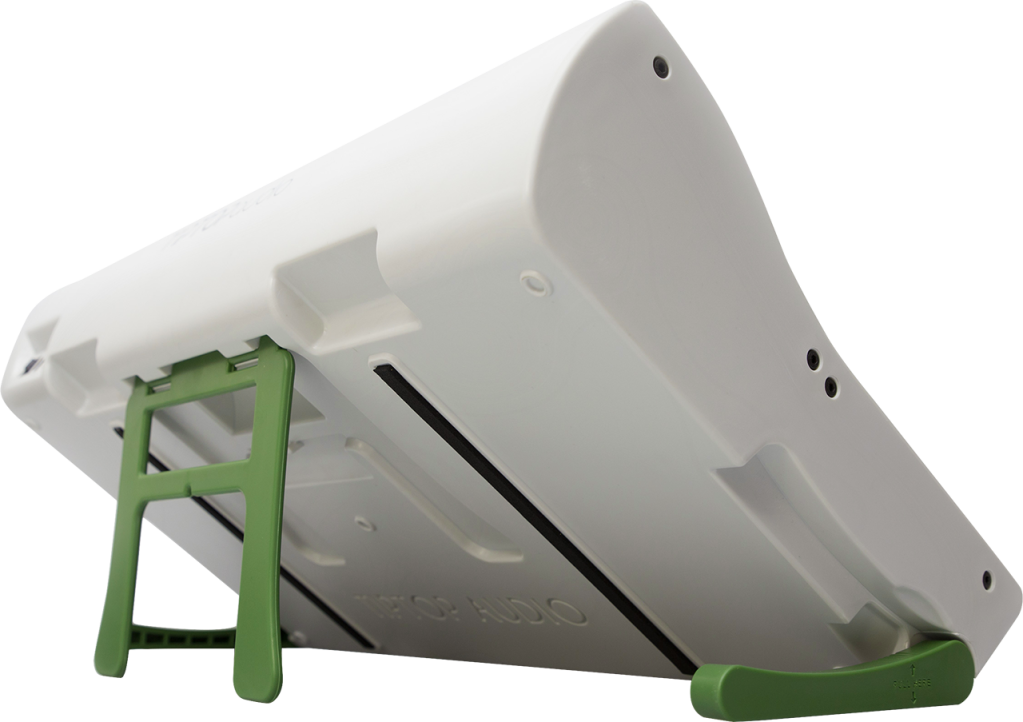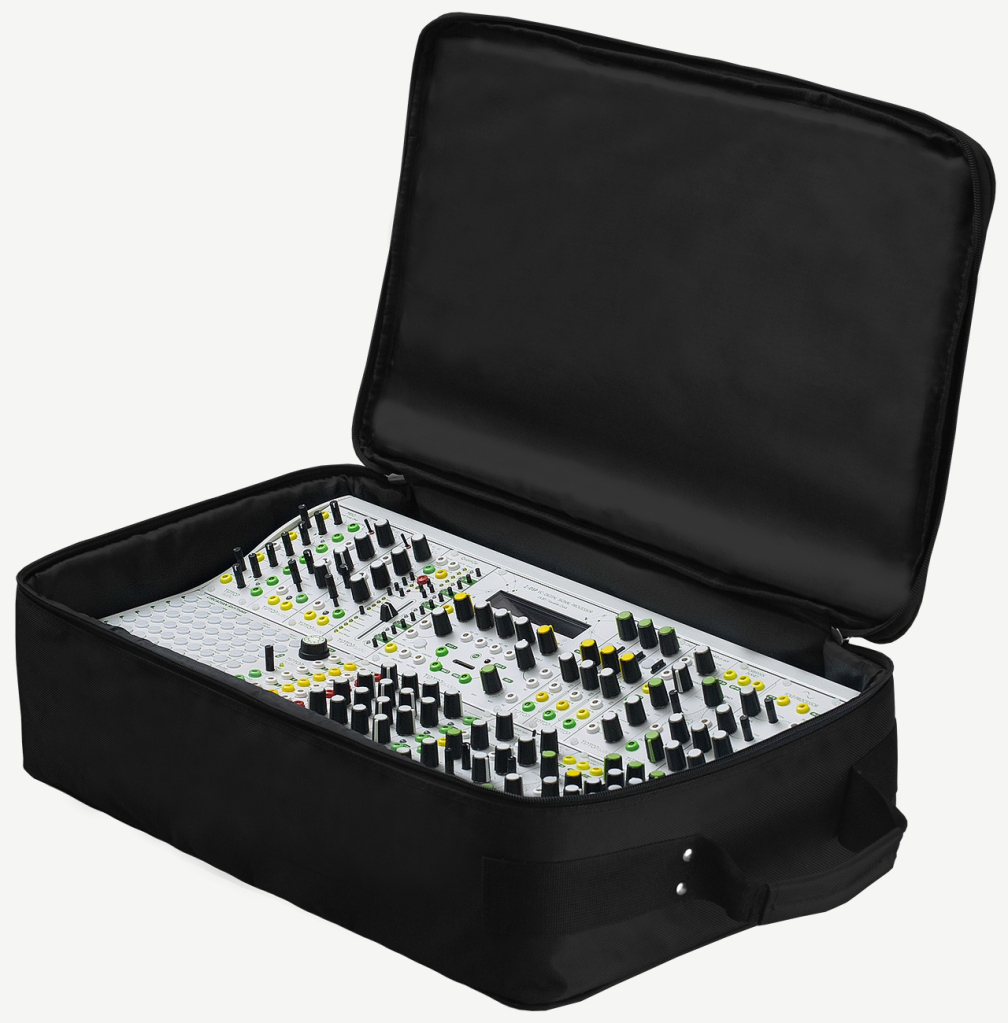Behringer’s anticipated moves into Eurorack are arriving – with a Eurorack case to get you started. There’s no price, but the product does look a lot like an existing competitor.
Behringer had already teased that they were planning low-cost entry into Eurorack modules, largely cloned from Roland’s decade-old vintage analog line. Behringer promised prices around fifty to a hundred bucks, deeply undercutting the prices of Roland’s own system 500, made in collaboration with boutique independent manufacturer Malekko. Those modules haven’t shipped yet, though.
Making a case as an accessory is a no-brainer for Behringer, given their desktop synths are already made to fit Euro cases and power. So, now we get Behringer’s own case entry.
And, no surprise, it looks … very familiar, based on an existing product in the market. Here’s a video with a run-down, plus a look at some modules.
What we know: it’s very close in design to the Tiptop Audio Mantis case’s unique form factor, handle, and stand design, minus some important details – more on that in a moment.
You get 2 rows of 140 hp, power supply, (+/-12 Volt and +5 Volts at 3 A), and a carrying handle that doubles as stand.
Significantly – it’s bigger (30% bigger) than the Tiptop offering, despite the “go” moniker, and it appears to lack the extra fold-out stands Tiptop added which may provide more stability on the Mantis. Of course, if you want more space, bigger also means more of that.
What we don’t know: the price.
Judging from comments on social media, to say nothing of sales of past products, for all those users who care about originality, a lot of other users really don’t. They either are unfamiliar with the other brand and product, or are familiar but don’t care so long as they get a cheaper price. (This is presumably the same logic that now has us flying cramped airplanes with no seat recline and no food and no luggage allotment because some fares appeared a little cheaper on an online search.)
But it’s also clear that Behringer critics and fans alike both are going on the assumption that the Behringer product will be the vastly cheapest offering, even though Behringer haven’t announced a ship date or price.
I mean, is that a fair guess? Maybe, sure. But the fact that Behringer doesn’t even have to announce a price before people assume it’ll be the cheapest is relevant. The Mantis isn’t terribly expensive, either, at 339EUR. Will Behringer be a little cheaper? Half the price? I don’t know.
Behringer is now able to make copies of shipping products, and then without shipping anything or announcing a price, it can already encourage customers to defer purchases of competing products.
Behringer now to almost everyone equates as the low-cost option. They now own the very idea of cheap – even before they ship anything.
Who’s to blame for this? Well, in part, the very people trying to attack Behringer’s brand reputation. Even as Behringer sometimes attacked its critics, all the buzz – the people complaining about them, the people defending them, perhaps this site included – cemented the idea that whatever had the Behringer name on it would be cheapest. That’s not to say you shouldn’t criticize companies. It is an illustration that you have to watch the perception of your message, especially if you’re criticizing a company as a competitor.


I think there are some takeaway lessons here for anyone in the industry wanting to compete:
- Don’t only play to customers on originality. There’s significant historical precedent for this in business. Apple Computer, for instance, infamously made a lot of noise about Windows “ripping off” their OS (in the form of the first versions of Windows). The upshot was that they inadvertently telegraphed to users that Windows was a good copy of the Mac, instead of focusing their message on why the Mac was a better choice and … well, the rest is history. Customers should hear a message about value, not just about what is or isn’t a ripoff.
- Assume most musicians now own some Behringer. Related to (1) – don’t shame Behringer customers, because at this point just about everyone has something the company has made, even if it’s some simple mixer or someone decided they couldn’t resist a Moog or 303 clone. Guilting users about gear is not a good strategy, ever. That said –
- You can reclaim cheap – and “shippingness.” Competing always works better than complaining. There are plenty of affordable products, plenty of original new products, shipping now. I do hope we don’t see the market just become high-end stuff for rockstars and then Behringer stuff for everyone else, because frankly, that’d be stupidly boring for those of us who love variety and are on a non-rockstar budget. So if Behringer now owns the notion of cheap or value, that is partly the fault of anyone who lets them claim the word. And customers love stuff they can get their hands on now – meaning if you’re shipping something and Behringer isn’t yet, that’s obviously an opportunity.
But I do hope that gear makers push back – this seems a natural and healthy process. There is legitimate reason to be concerned about Behringer obliterating the perceived value of hardware. A lot of modular is varied and innovative because the ecosystem supports one-person operations, crazy ideas, and assembly-intensive products. There is a cost to everyone when there’s a race to the bottom – as the ugly world of “fast fashion” has shown in clothes, for instance.
It’s painful watching people talk about “inflated” prices – it shows a misunderstanding of the cost of small-batch assembly and support and taking risks on new designs.
So, the rest of modular world doesn’t need to argue for being expensive, but it does need to keep visible the process by which gear is designed and made.
At the same time, makers should deservedly point out value and affordability where it exists.
In fact, I think it’s telling that you’ll often now hear people say Behringer started the idea of cheap analog. That shows that many (all?) competitors lost control of the narrative. KORG’s original monotron line, for instance, remains one of the cheapest mainstream electronic instruments ever, as does their extensive volca range.
We need to get out of this echo chamber, which means to stop allowing conversations to become polarized between two sides. So let’s get back to the facts.
As far as Behringer Go – and whatever modules may ship – we have to wait and see – how’s the price, what’s the actual quality of the thing in use.
But you don’t have to wait for inexpensive options. Take a look at the Tiptop offering – and tons of stuff from Eurorack originator Doepfer, including cases. There are also products like the ultra-portable Pico from Erica Synths, or more recently the Crea8audio line, which also features the NiftyCase, with audio and MIDI integration built-in. Crea8audio have a starter bundle, too, for around $270 street.
And that’s to say nothing of the many desktop and software options, which for some people are a better starting point anyway, something lost in all this hype about wires.
But surely the thing that really will burst the Eurorack bubble is if it stops attracting fresh customers – because it is an ecosystem. In a world of unsustainable growth, it’s also one area that is reasonably positive – people discovering advanced sound synthesis.
Affordable modules and cases to get people started are ultimately something the modular market needs – and has already started to figure out. Handled carefully and competitively, the entry of Behringer will be a net positive.